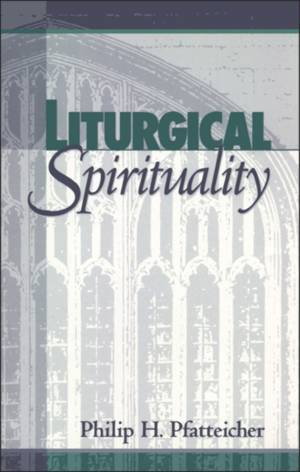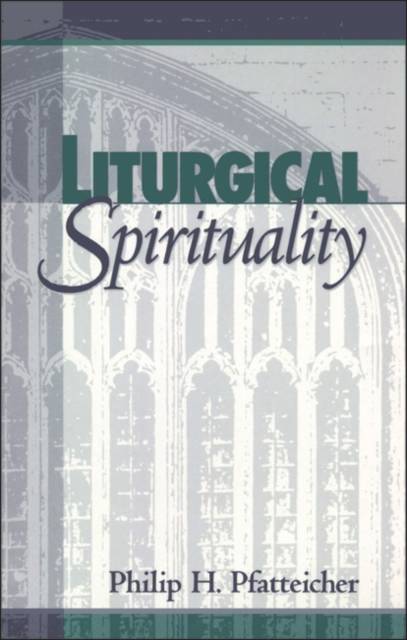
- Retrait en 2 heures
- Assortiment impressionnant
- Paiement sécurisé
- Toujours un magasin près de chez vous
- Retrait gratuit dans votre magasin Club
- 7.000.0000 titres dans notre catalogue
- Payer en toute sécurité
- Toujours un magasin près de chez vous
Description
Well-known liturgical scholar and writer Philip Pfatteicher turns his attention in this book to "liturgical spirituality" as distinct from "liturgy and spirituality," which assumes two essentially separate disciplines.
"Liturgical spirituality" is a holistic concept, bringing together both liturgy and spirituality with reference to the interior life of the spirit that is formed and nurtured by the church's liturgy. Pfatteicher acknowledges that there are other kinds of spirituality that appear to flourish apart from and in addition to the liturgy: for example, the spirituality of the desert ascetics of the early centuries of christianity, the devotion of the Religious Society of Friends, and many forms of meditation and spiritual discipline such as the Spiritual Exercise of Ignatius Loyola. The focus of the present volume, however, is on the spiritual life as formed by the liturgy, the ordered form of Christian worship, East and West, Catholic and Protestant.
In addition to the form of worship one might experience on a Sunday morning, Liturgical Spirituality guides the reader through and into the experience of daily prayer, the Easter Vigil, the Church Year, the Eucharist, hymns and music, Baptism, and even church architecture as "hallowing space."
In 1955 Louis Bouyer published an admirable study entitled Liturgical Piety, written before Vatican II and its far-reaching reforms that fundamentally changed the entire Western church. Philip Pfatteicher has now taken up the challenge of expanding upon Bouyer with a current and invigorating study not of "liturgical piety" but of "liturgical spirituality."
Philip Phatteicher is Professor of English at East Stroudsburg University in Pennsylvania, a frequent writer and lecturer on liturgical issues, and author of A Dictionary of Liturgical Terms and The School of the Church: Worship and Christian Formation, both published by Trinity Press.
"Liturgical spirituality" is a holistic concept, bringing together both liturgy and spirituality with reference to the interior life of the spirit that is formed and nurtured by the church's liturgy. Pfatteicher acknowledges that there are other kinds of spirituality that appear to flourish apart from and in addition to the liturgy: for example, the spirituality of the desert ascetics of the early centuries of christianity, the devotion of the Religious Society of Friends, and many forms of meditation and spiritual discipline such as the Spiritual Exercise of Ignatius Loyola. The focus of the present volume, however, is on the spiritual life as formed by the liturgy, the ordered form of Christian worship, East and West, Catholic and Protestant.
In addition to the form of worship one might experience on a Sunday morning, Liturgical Spirituality guides the reader through and into the experience of daily prayer, the Easter Vigil, the Church Year, the Eucharist, hymns and music, Baptism, and even church architecture as "hallowing space."
In 1955 Louis Bouyer published an admirable study entitled Liturgical Piety, written before Vatican II and its far-reaching reforms that fundamentally changed the entire Western church. Philip Pfatteicher has now taken up the challenge of expanding upon Bouyer with a current and invigorating study not of "liturgical piety" but of "liturgical spirituality."
Philip Phatteicher is Professor of English at East Stroudsburg University in Pennsylvania, a frequent writer and lecturer on liturgical issues, and author of A Dictionary of Liturgical Terms and The School of the Church: Worship and Christian Formation, both published by Trinity Press.
Spécifications
Parties prenantes
- Auteur(s) :
- Editeur:
Contenu
- Nombre de pages :
- 306
- Langue:
- Anglais
Caractéristiques
- EAN:
- 9781563381942
- Date de parution :
- 01-04-97
- Format:
- Livre broché
- Format numérique:
- Trade paperback (VS)
- Dimensions :
- 140 mm x 216 mm
- Poids :
- 417 g

Seulement chez Librairie Club
+ 242 points sur votre carte client de Librairie Club
Les avis
Nous publions uniquement les avis qui respectent les conditions requises. Consultez nos conditions pour les avis.






